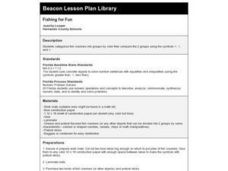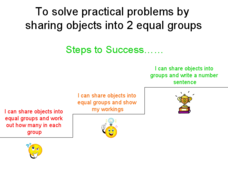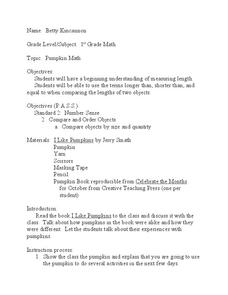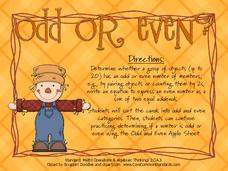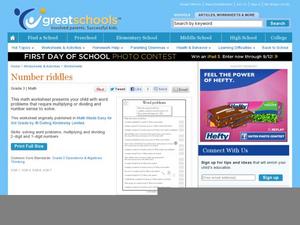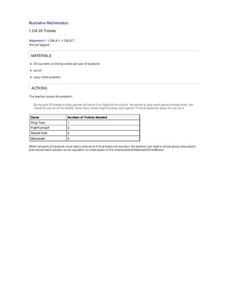Curated OER
Fishing For Fun
Second graders categorize fish crackers into groups by color and compare the two groups using the symbols <, =, and >. They use concrete objects to solve number sentences with equalities and inequalities.
Curated OER
What on Earth is Greater Than?
Students compare things that are greater than, less than, or equal to, compare the Earth to other planets, and list planets from greatest size to smallest size.
Curated OER
Roll On
Second graders, in groups, develop models to show how forces such as gravity, friction, equal, unequal forces and change in direction work on marbles.
Curated OER
Multiplying in Any Order
In this mathematics worksheet, 2nd graders use counters to show an array. Then they write the multiplication fact for that array. Students also identify if the reverse of a multiplication fact is equal and explain why.
Curated OER
Fundamentals of Multiplication
Third graders examine how multiplication is a quicker and neater form of addition and how they can simulate the concept of groups and (sets) to construct the visual effect of multiplication by way of forming groups of (2's) (3's) and (4's).
Curated OER
Problem Solving: Division
A cute zoo theme sets the tone for a problem-solving activity which primes early learners for division. They separate zoo animals into equal groups and then write an equation that expresses the action.
Curated OER
All Kinds of Numbers
Count and compare numbers and fractions using "greater than" and "less than." Learners count on by 2s and 10s and represent the end number with base ten blocks, counters, and cups. They use circle stickers to illustrate fractions and...
Curated OER
More Monkeys, Fewer Monkeys, Equal Monkeys
Students compare sets of objects. In this identification lesson, students inspect sets of monkeys and identify them as more, less, or equal to the other sets. Students observe a video clip discussing comparisons.
Curated OER
Pumpkin Math
Students discover how to measure the circumference of objects. In this measurement lesson, students use a pumpkin and a tape measure to estimate and find the circumference of the pumpkin.
Curated OER
Same Number
For this recognizing same numbers worksheet, learners count objects and draw lines to match the groups with the same number of items. Students match three groups.
Curated OER
Introduction to Estimation and Making Arrays
Students explore the concept of estimating and organizing a group of objects into an array to count the exact number of items. They create their own arrays and practice elements of estimation.
Creative Educator
Fantastic Fractions
Groups of learners create an animation illustrating fractions using common objects. They choose everyday objects that they can divide into fractions. They take pictures of the objects dividing into fractions and create an animation with...
Delaware Math Cadre Elementary Committee
Operations and Algebraic Thinking
How to use the relationship between multiplication and division to solve math word problems is the focus of the lesson presented here. In it, fourth graders work in groups to solve problems posed by the teacher. Then, each group is given...
Discovery Education
Architects in Action
Hands-on and real-world applications are great ways to teach mathematical concepts. Creative thinkers examine how ratios are used to create scale models of buildings and structures. They practice working with ratios by looking at a map...
Curated OER
Odd or Even
Children are told that an odd number is one that does not have a partner and an even number is one that has a partner. It's not the way I would explain it, but no matter, the activity and worksheet are still good. Children analyze each...
Curated OER
A Mass of Pennies
Learners estimate and determine the number of cents (pennies) that are needed to equal the mass of a variety of common objects. They develop a process for measuring and explore concepts related to units of measurement.
It's About Time
Conservation of Momentum
Assist your class with understanding collisions as they apply the Law of Conservation of Momentum. Pupils measure the momentum before and after manipulation of two objects so that one strikes another in an inelastic collision. The lesson...
DK Publishing
Number Riddles - Word Problems
Although this set of 16 word problems aren't the most riveting, they give clear practice opportunities for learners to solve missing factor and dividend problems. Each scenario is only a sentence or two, and some don't even involve...
Michigan Technological University
Giant Mirrors
Did you know some retailers use curved mirrors in their fitting rooms to make customers look thinner? Pupils view themselves in convex and concave mirrors to understand the difference. The resource includes big ideas for multiple age...
Curated OER
Erosion in Different Soils
Fourth graders observe and identify the effects of weathering and geological activities. They take part in an excellent hands-on group activity called "Erosion Race," in which each group tries to simulate erosion of soil in the quickest...
Laboratory for Atmospheric and Space Physics
Planetary Distances on the Playground
There's no need to stay inside; get out of the classroom and create a scaled map of the solar system on your playground field! In collaborative groups, scholars identify the distance between the sun and other planets, place planet...
Curated OER
Our Story: Martin Luther King Jr. and Nonviolence
In this parent and child activity, young learners read Martin’s Big Words and a biography of Dr. Martin Luther King Jr. There is a wonderful guided reading pdf that defines challenge words and provides reading tips. The object of this...
Florida Center for Reading Research
Phonics: Letter- Sound Correspondence, Brown Bag It
Sorting objects according to their initial sound get scholars thinking about letter-sound correspondence. With 26 brown bags labeled with a letter of the alphabet, learners browse magazines and cut out images that begin with the...
Curated OER
20 Tickets
A great hands-on activity involving adding and subtracting, beginner mathematicians determine how many games can be played with 20 tickets. Instead of tickets, youngsters use 20 counters or linking cubes to represent the amount of...


